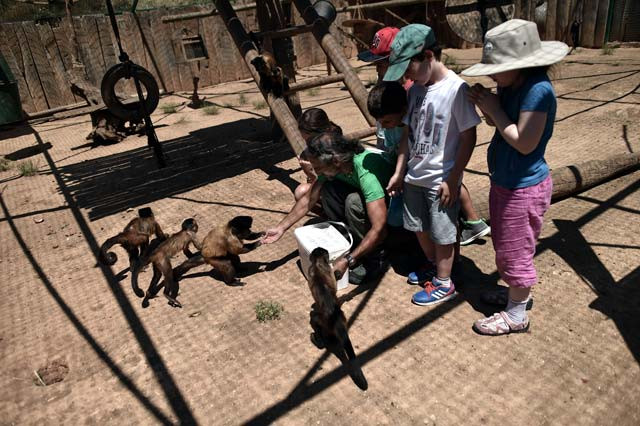From cats to rhinos, Greek crisis takes toll on animals
It isn't just humans who are suffering as Greece tries to claw its way out of economic crisis

An employee of the Attica Zoological Park, surrounded by children, feeds black-capped Capuchin monkeys in Spata, near Athens, on July 23, 2015. PHOTO: AFP
"I'll have to call the bank again," sighed Jean-Jacques Lesueur, the founder of Athens' only zoo.
 Chimpanzees eat at the Attica Zoological Park in Spata, near Athens, on July 23, 2015. PHOTO: AFP
Chimpanzees eat at the Attica Zoological Park in Spata, near Athens, on July 23, 2015. PHOTO: AFPThe Frenchman had been trying for days to place a 6,000 euro ($6,600) order of frozen fish for the zoo's six dolphins. Without fresh supplies from abroad, he feared he would have to put them on a diet.
Normally the order would be simple enough, but Greece imposed strict capital controls on June 29 as panicked account holders began emptying the nation's banks.
 A ring-tailed Lemur jumps inside its cage at the Attica Zoological Park in Spata, near Athens, on July 23, 2015. PHOTO: AFP
A ring-tailed Lemur jumps inside its cage at the Attica Zoological Park in Spata, near Athens, on July 23, 2015. PHOTO: AFPThe measures have stopped the flight of cash from the debt-crippled country -- but in doing so have made life extremely difficult for Greek firms that do business abroad.
All bill payments to foreign countries must be approved by a government commission, a process that is proving so slow that distrustful suppliers are now asking Greek firms to pay in advance.
 An employee of the Attica Zoological Park plays with a bottlenose dolphin in Spata, near Athens, on July 23, 2015. PHOTO: AFP
An employee of the Attica Zoological Park plays with a bottlenose dolphin in Spata, near Athens, on July 23, 2015. PHOTO: AFPLesueur, who is in his seventies, finally managed to get the dolphin food payment approved late Thursday. But he's still unable to pay for a shipment of mealworms, beloved of the zoo's two giant anteaters, and nutritional supplements for the rhinos.
"They eat a kind of local clover, but we also feed them special imported biscuits," Lesueur told AFP as he watched the three rhinos lazing under a tree. "Provisionally we might be able to give them horse biscuits, but it isn't ideal."
The zoo feeds most of its animals with local meat and vegetables, but it also spends some 80,000 euros ($87,000) a year on imported food for its more fussy residents.
 An employee of the Attica Zoological Park feeds a Lion in Spata, near Athens, on July 23, 2015. PHOTO: AFP
An employee of the Attica Zoological Park feeds a Lion in Spata, near Athens, on July 23, 2015. PHOTO: AFPLesuer said the amount may sound like "peanuts", but for some species, "it's a question of life or death."
The dolphins eat fatty fish impossible to find in Greece. Then there's the anteaters, who love digging their snouts into a special imported powder that replaces the termites they would eat in the wild.
A gaggle of delighted toddlers watched as the two large creatures snacked on some worms. The zoo, under the slogan "we stay together during tough times," is offering free entry to children this summer on weekdays.
 A Baringo Giraffe eats from a trunk at the Attica Zoological Park in Spata, near Athens, on July 23, 2015. PHOTO: AFP
A Baringo Giraffe eats from a trunk at the Attica Zoological Park in Spata, near Athens, on July 23, 2015. PHOTO: AFPBut Lesueur has had to increase ticket prices for adults after tax rises took effect this week as part of tough reforms demanded by Greece's creditors as Athens seeks a bailout worth up to 86 billion euros ($94 billion) over three years.
In a park in central Athens, Cordelia Madden-Kanellopoulou looked down and exclaimed to a black cat at her feet: "Hello beauty, who are you?"


















COMMENTS
Comments are moderated and generally will be posted if they are on-topic and not abusive.
For more information, please see our Comments FAQ